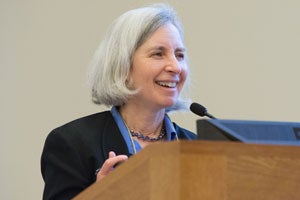Harvard Law School Dean Martha Minow and John Levi ’72, LL.M. ‘73, the chairman of the Legal Services Corporation, presented the report of the Corporation’s Pro Bono Task Force in in HLS’s Wasserstein Hall on Oct. 3, at an event hosted by HLS Professor David Wilkins ‘80, director of the Law School’s Program on the Legal Profession. Established in 1974 by President Nixon, the LSC, a private, nonprofit corporation, is the nation’s largest funder of legal aid providers for low-income Americans.
Minow, who co-chaired the task force with Harry J.F. Korrell III, oversaw a body that sought new ideas to increase attorney involvement in pro bono cases. Among its results were recommendations for the LSC and its grantees, as well as requests of leaders in the legal profession, which included:
- Forming a professional association of pro bono coordinators at LSC-funded organizations;
- Asking Congress to create a new Pro Bono Innovation/Incubation Fund modeled on LSC’s successful Technology Initiatives Grant (TIG) program; and
- Developing a fellowship program for new graduates and emeritus lawyers designed to build support for civil legal services and pro bono within firms, law schools, and the legal profession as a whole.
- Allowing lawyers to take on limited-representation matters or unbundle services; and to take on pro bono matters in jurisdictions other than those in which they are licensed to practice.
Levi addressed the room to recount the struggles of the legal system, including the tremendous gap in access to legal advice. Turning to the audience, he asked, “If we don’t do it, who will?”
Minow recalled the words of North Carolina’s Chief Justice Sarah Parker, who told her that there are three “learned professions.” “There are doctors who take care of our health. There are theologians who take care of our spirit, and then there are lawyers,” she said. “Lawyers help us with our citizenship, and our civilization.”

Professor David Wilkins introduces the panel
“The challenge of our legal system is that it’s not self-executing,” Minow said. “It requires lawyers, it requires advocates.” Legal aid, including that coming from lawyers taking on pro bono cases, is essential to making the justice system complete. “It may not sound sexy, but it’s the difference between being able to have your life versus having a crisis every day. And that’s why this work is so unbelievably important.”
A panel discussion followed the remarks. James Sandman, one of the panelists and the president of the LSC, remarked that one of the essential points made in the report focuses on the need to centralize the existing information on how to get involved in pro-bono work. “There’s a lot of experience available out there on how to run a great pro-bono program,” Sandman said. “But we need to do a better job of coordinating that experience and making it available for people.” The LSC recommendation, Sandman said, is to assemble the best information and provide it to interested individuals, in addition to help with actual implementation.
Other panelists considered how to bring lawyers who don’t deal with low-income clients on a daily basis into the fold. Mary Ryan, a partner at Nutter, McClennen & Fish, said part of the challenge is creating an infrastructure to bridge the gap between lawyers who meet the needs of corporations and those who meet the needs of people. “You’ll get more volunteers, sometimes, from different segments of practice, when they know the case will take 15 hours instead of 100 hours,” she said.
Hunton & Williams partner Robert Grey Jr., a former president of the American Bar Association, said that his firm, a small Raleigh office with 100 percent pro bono participation, started a firm-wide race. “What we did was say, if Raleigh can do it, can Richmond do it?” he said. “Instead of telling everyone they have to do 50 hours, tell everyone they have to do something.”

Justice Margaret Marshall
The idea that every small contribution counts echoed through the event. Ryan said one of the ways to drill that in is to make it the social norm at firms. “This is the way we do it here,” she said.
The closing speaker, former Chief Justice Margaret Marshall of the Supreme Judicial Court of Massachusetts and current senior research fellow and lecturer on law at HLS, said the report provides “a clear roadmap, an easy to read blueprint” to greater pro bono involvement. In her own life, Marshall said, the importance of legal advice became especially clear when caring for her mother, who suffered from Alzheimer’s. “It’s partly having someone to say, don’t worry, I’ll take care of it,” she said.
—Katie Zavadski
